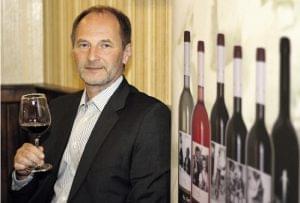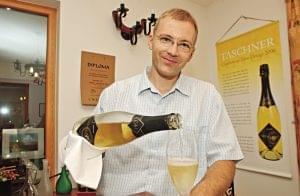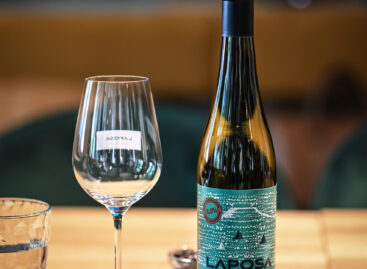Magazine: A great year for wines, optimistic winemakers

János Eszterbauer
owner
Eszterbauer Borászat
János Eszterbauer, the owner of Eszterbauer Winery told our magazine that they believe this is going to be an excellent year for wines; all they need now is not too much rain in September. The winery’s sales are growing year after year. He believes that in comparison with prices in Western Europe, Hungarian wines are still priced too low. In the consumption of quality wines, demand is the biggest for products in the HUF 800-2,000 price category.

Csaba Koch
owner
Koch Borászat
Csaba Koch, the owner of Koch Winery Kft. told Trade magazin that he expects sales growth in the next year and a half in the category of medium-priced wines, and also in the segment where a bottle costs more than HUF 1,000. Mr Koch opines that wines are too expensive in bars and restaurants. One of the reasons for this is that the product is going through too many hands before it gets from the winery to the restaurant table.

Gergő Gelencsér
managing director
Canter Borház
Gergő Gelencsér, managing director of Canter Wine House also thinks that 2018 is going to be a great year for wines. His experience is that the appearance of new consumer generations in the market created demand for different-type wines. These consumers aren’t looking for mass products but more characteristic and unique wines, also being interested in the philosophy of winemakers.

Gergő Soltész
owner
Ostoros Pincészet
According to Gergő Soltész, chairman and head of Ostoros-Novaj Wine Zrt., the 2018 vintage will be a good one and he calculates with a two-digit sales growth. Entering new markets can play a big role in this, and in general Mr Soltész thinks that the success of Hungarian wines lies in export, which requires hard work, expertise and conscious marketing activity.

Kurt Taschner
owner
Taschner Bor- és Pezsgőház
Kurt Taschner, the owner of Taschner Wine and Sparkling Wine House Kft. informed us that about 20 percent more grapes would be harvested this year than in 2017. He sees no potential for sales growth in the domestic market, his experience is that sales are standing still or even declining a bit.

Gábor Sebestyén
business unit director
Ital Magyarország
Bognár Pincészet
Gábor Sebestyén, the head of Ital Magyarország’s Bognár Winery products business line told: sales hardly changed in the last few years, but consumption habits are changing. Single-variety, dry white wines with a geographical indication, priced between HUF 500 and 1,000 are gaining ground, while sales of table wines sold for less than HUF 500 are decreasing.

Krisztián Kathona
purchasing director
Borháló Borkereskedés
Krisztián Kathona, purchasing director of Borháló Wine Trading talked to our magazine about trends that are good from a consumer perspective. Consumer show increasing demand for larger-sized products, because they know that they will get good quality wines for less than in a 0.75-litre bottle. The purchasing director’s view is that Hungary’s climate and soil make the country a good place for making a wide range of different wines, and not for mass production.
Mr Eszterbauer pointed out that everything comes from Western Europe, including the change in consumption habits. However, winemakers are always a little ahead of consumers, so their tastes differ a bit. He stressed that lighter wines need to be made instead of very tannic ones. As for his winery, the main direction remains to be Kadarka and Bull’s Blood.
Mr Koch told Trade magazin that wine consumption is turning towards light whites, and besides fragrant varieties Rieslings are also becoming trendy. People are drinking less full-bodied red wine and rosé sales are stagnating. Canter Wine House makes some of their wines using elements of New World technology. They think that if we want Hungarian wines to be appreciated abroad again, we must focus on the peculiar characteristics of grape varieties unique to Hungary. Mr Soltész revealed that Ostoros-Novaj Wine experienced further growth in the demand for rosé wines, but Irsai Olivér also stayed popular. More and more young people drink these wines.
Mr Sebestyén opines that Sauvignon Blanc made great progress, and Cserszegi Fűszeres and Irsai Olivér wines are popular in every price category. His view is that light white and red wines should be the main direction of innovation, marketed with a simple and youthful design. Mr Taschner reckons that the popularity of rosé wines is declining.

Márton Elek
director of strategy
Borháló Borkereskedés
Márton Elek, director of strategy with Borháló Wine Trading explained that Hungarian wineries are relatively small, therefore production can’t really focus on export. They organise more than 500 wine tasting events a year all over Hungary, with the participation of wine experts and winemakers.
As for wine marketing, Mr Gelencsér believes that it should be treated as a part of tourism development. Winemakers need help not only in wine making, but also in the fields of gastronomy and creating an atmosphere that is characteristic of the region. Mr Sebestyén’s experience is that collective marketing works very well in certain regions, but it is less successful in others. Mr Eszterbauer added that the cooperation between the National Council of Wine Communities (HNT) and the Ministry of Agriculture could be better sometimes.
About alternative packaging solutions: Mr Gelencsér really likes bag-in-box products, for instance they are perfect for parties. Still, the big breakthrough hasn’t happened yet – perhaps the young generation will get to like bag-in-box more. Mr Koch is of the opinion that alternative packaging solutions are best used with the good-quality wines that are consumed daily, because of the lower price and the smaller burden they put on the environment. Mr Sebestyén informed that bag-in-box sales in 2018 were twice as big as in 2017; 1.5-litre magnum bottles are also popular. Mr Taschner stressed that the decision is up to consumers: if they want to drink wine from a bag, they should be allowed to do that. Mr Elek told they already sell premium wines in magnum bottles, in some cases reducing the price of wine by 40-50 percent per 0.75 litre. //
Related news
What can cause the price of a wine to increase tenfold?
There are fewer of them worldwide than the number of…
Read more >Alcohol-free novelty in the Balaton wine world
Laposa Birtok has reached a new milestone: it has introduced…
Read more >Szürkebarát Duel in Badacsonytördemic
A truly unique wine event of national significance is coming…
Read more >Related news
Corporate leaders’ commitment to sustainability at record level
According to the latest data from the K&H Sustainability Index,…
Read more >FAO food price index rose slightly in June due to higher prices of meat, dairy products and vegetable oils
The Food and Agriculture Organization of the United Nations (FAO)…
Read more >What can cause the price of a wine to increase tenfold?
There are fewer of them worldwide than the number of…
Read more >





